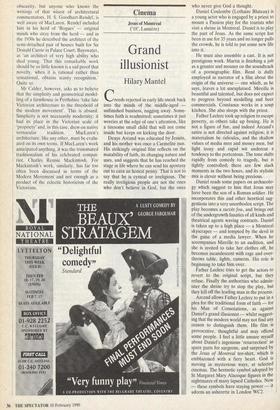Cinema
Grand illusionist
Hilary Mantel
Creeds rejected in early life sneak back into the minds of the middle-aged unfinished business, nagging away. Some- times faith is readmitted; sometimes it just worries at the edge of one's attention, like a tiresome small child that will not come inside but keeps on kicking the door,
Denys Arcand was educated by Jesuits, and his mother was once a Carmelite nun. His strikingly original film reflects on the mutability of faith, its changing nature and uses, and suggests that he has reached the stage in life where he can send his apostasy out to earn an honest penny. That is not to say that he is cynical or irreligious. The really irreligious people are not the ones who don't believe in God, but the ones who never give God a thought.
Daniel Coulombe (Lothaire Bluteau) is a young actor who is engaged by a priest to mount a Passion play for the tourists who visit a shrine in Montreal. Daniel is to play the part of Jesus. As the same script has been in use for 35 years and no longer pulls the crowds, he is told to put some new life into it.
He must also assemble a cast. It is not prestigious work. Martin is finishing a job as a grunter and moaner on the soundtrack of a pornographic film. Rene is dully employed as narrator of a film about the origin of the universe — one which, as he says, leaves a lot unexplained. Mireille is beautiful and talented, but does not expect to progress beyond modelling and beer commercials. Constance works in a soup kitchen. She also sleeps with the priest.
Father Leclerc took up religion to escape poverty, as others take up boxing. He is not a figure of fun, and indeed Arcand's satire is not directed against religion; it is materialism he ridicules, and the shallow values of media men and money men, but light irony and rapid wit undercut a tendency to the portentous. The tone shifts rapidly from comedy to tragedy, but is tightly controlled; there are few slack moments in the two hours, and its stylistic mix is clever without being precious.
Daniel reads some papers on archaeolo- gy which suggest to him that Jesus may have been the son of a Roman soldier. He incorporates this and other heretical sug- gestions into a very unorthodox script. The play becomes a succes fou, and brings out of the undergrowth fanatics of all kinds and theatrical agents waving contracts. Daniel is taken up to a high place — a Montreal skyscraper — and tempted by the devil in the guise of a media lawyer. When he accompanies Mireille to an audition, and she is invited to take her clothes off, he becomes incandescent with rage and over- throws table, lights, cameras. His role is beginning to take him over.
Father Leclerc tries to get the actors to revert to the original script, but they refuse. Finally the authorities who admin- ister the shrine try to stop the play, but they kill off the leading man in the process.
Arcand allows Father Leclerc to put in a plea for the traditional form of faith — for his Man of Consolations, as against Daniel's grand illusionist — whilst suggest- ing that the modern world may not find any reason to distinguish them. His film is provocative, thoughtful and may offend some people. I feel a little unsure myself about Daniel's ingenious 'resurrection' as spare parts for surgeons, and surprised by the Jesus of Montreal tee-shirt, which Is emblazoned with a fiery heart. God is moving in mysterious ways, at selected cinemas. The hermetic symbol adopted by St Margaret Mary Alacoque figures in the nightmares of many lapsed Catholics. Now — these symbols have staying power — it adorns an usherette in London WC2.


















































 Previous page
Previous page